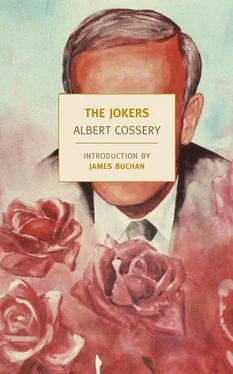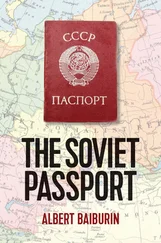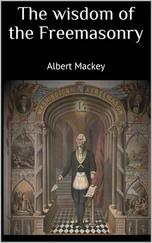“Don’t worry about the package,” he said sarcastically. “It’s not a bomb. These are my old shoes that I’m taking to the cobbler. The soles have completely come off. You can see: I’m walking barefoot at the moment.”
“How could you think…!” Karim protested feebly.
Still, he lowered his eyes to be sure that Taher was telling the truth: in fact, his friend’s feet were bare. For an instant he was transfixed, unable to look away from Taher’s feet. To wear a starched collar and no shoes, how strange! Karim didn’t know whether to laugh or cry.
“I’m truly sorry, brother!”
“Don’t be; it’s not at all important. I’ve endured every possible misery. I don’t need to live in an apartment with a terrace. I love palaces — I love to destroy them!”
“It’s a servant’s quarters!” Karim exclaimed. Then, more quietly: “How do you know where I live? You’ve been spying on me!”
Taher smiled mockingly, as if Karim was a naive child who needed everything explained.
“We know everything about you,” he said. “You think you’re so clever, but we know everything you’re up to, you and your friends. Did you know that the police suspect us for your nonsense? We won’t tolerate it much longer. That’s why I want to speak to you.”
Without thinking, he adopted a conspiratorial voice — inexplicably, since the road was devoid of a single human soul.
“What nonsense?” asked Karim, irritated by his hissing.
“The posters sucking up to the governor — you think I don’t know where they come from?”
“What is it about them that bothers you?”
“They make us look ridiculous to the police. And I don’t like that. We’re not pranksters!”
Taher was outraged at the thought that the police took him for a clown for using such primitive means to overturn the government. To impute these types of inanities to him was to attack his honor as a revolutionary. It besmirched his entire past as a militant, all his years in prison. He saw himself sinking in the esteem of the police, and he fumed with rage. And at the same time his pain was tinged with sorrow because it was his old comrade in arms, this traitor turned puppet, who was responsible for the affront.
“Don’t worry about that,” said Karim. “The police don’t suspect you one bit. They know perfectly well that you’re a serious bunch.” He added, as if for his own sake: “Just like them. Let me tell you something. You’re out of the loop. The police aren’t ignorant of the fact that your brand of revolutionary would never do something like this. Don’t you know they’re making progress all the time? Thanks first of all to what your people leaked during interrogations, but also to the fact that the government has given manuals to the secret police, in which they explain your psychology and how to combat your theories. So you see, they know all about you now. They know that you could never change your ways so drastically.”
“In any case, you ’ve changed,” Taher responded bitterly.
By mutual agreement, they’d sat down on the parapet, facing the sea. They were quiet, their gazes lost in the immense black void. Karim was savoring this moment of reconciliation. But Taher’s mania, his need to win or die, could know no peace. Slowly he turned toward Karim, awaiting a gesture, a word of repentance or regret. He felt the sadness of a terrorist pressed into action, having to go about his bloody work despite the love and tenderness that still drew him to his victim. His heart bled, and he wanted to beg Karim to renounce this foolishness, to resume the idealism of his past. Sweat drowned his shrunken features; he might as well have been covered in tears.
Taher’s look pierced Karim like a dart. His heart bled, too. He was angry at his old friend for having reappeared to remind him of those dark times, which stank of pain and suffering. He had made his peace with this laughable, detestable world. He didn’t want to change anything; he took it for what it was, and its blind and lame inhabitants with it. It was like a giant gesture of love. He no longer believed in the impoverishment of the people. Was he rich? He was the poorest of the poor, and yet happy for it. Suddenly his feelings rebelled against this scowling ghost that had come from the past to rip away his joy, and in a provocative, proud voice he said:
“Yes, I’ve changed. And I’m glad of it.”
Taher leaped upon him. He grabbed him by the back of his jacket and held him against the parapet.
“Do you know that our comrades are imprisoned and tortured, while you’re out happily postering the walls of the city with praise for their executioner?”
“Listen, Taher! It’s not like I slept with your sister! What I did do, you’ll never get. But it’s the only way to fight the governor, believe me.”
“A funny way!” snickered Taher. “I know your master, you know. I’ve heard all about him. He’s the governor’s sort: a landlord who lives like a prince. What can he know about the pain of the people?”
“Leave him alone!” Karim shouted. “I love that man, understand! Believe me, not only will I never leave him, but if he asked me to, I’d die for him!”
Taher felt his blood drain away. The violence of Karim’s passion suffocated him; it was blasphemy. For him it was only possible to love the people. And because Karim was part of the people, he’d never completely lost his feelings of affection and confidence. He’d pardoned Karim’s turpitude, always hoping that their separation was only temporary, that Karim would be faithfully driven to the revolution once again. But now he saw how far his comrade had strayed — from him, from the idea for which he’d fought and suffered. Taher saw that he was acting in an entirely new universe, in which he was not only excluded but was an object of mockery. Jealousy pierced him, opening a gaping wound in his heart. The night was poisoned; neither the stars, nor the sea, nor the pearly necklace of streetlamps lighting the glittering curve of road could save him from the sharpness of this death. But this feeling only lasted for a moment — then the immanent reality of the revolution tore him out of his painful torpor. Morbid curiosity made him want to encounter this man whom Karim — full of hellish pride — placed higher than the oppressed people. If for only an instant he could confront him before Karim, he’d be able to destroy the idolatrous image set up in his comrade’s mind. He’d expose the vanity, the nihilism, the false seductiveness of this perfidious soul, who wallowed in luxury while proclaiming subversion, like a magician at a fair. Maybe then Karim would understand that he was deluded, that all these stupid initiatives for overthrowing the government were destined to fail, and he’d return to the respectable precepts of real combat. The idea was wildly tempting. In fact, he had no choice: he needed Karim for a hazardous exploit — one the revolution demanded — things he hadn’t dared to speak of yet. In his current state of mind Karim wouldn’t even have stopped to listen. Taher summoned up all his powers of persuasion; he was going to employ a subtler tactic than those he used to inspire revolutionary faith in a roomful of the unemployed.
“I want you to do something for me,” he said with surprising calm.
“What?”
“I’d like to meet this man you love so much. You and I go way back, and all I’m asking is for you to put me in touch with him — I want to speak with him.”
Karim smiled slightly, and his face relaxed; the request visibly enchanted him.
“With pleasure,” he said. “I’m sure that he’d like to meet you, too. You know, he’s very open-minded. He’s interested in every kind of human activity.”
Читать дальше












